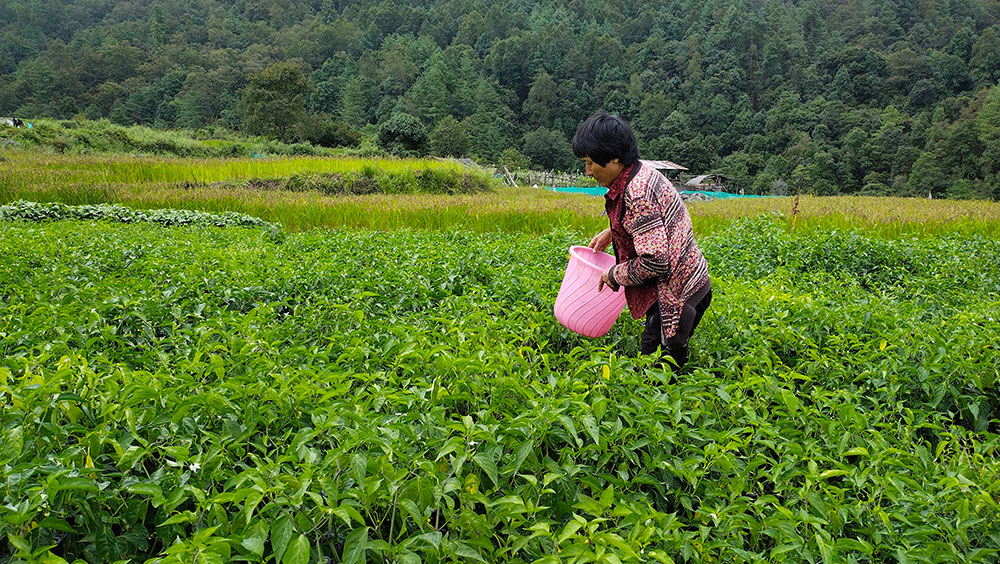YK Poudel
In 2019, Bhutan embraced the ambitious goal of becoming the world’s first 100 percent organic nation by 2020 to make agriculture more sustainable and establish a resilient, productive organic farming system while preserving the environment.
The goal, which was announced with the initiative of the National Organic Flagship Programme (NOFP) under the National Organic Programme (NOP), was later deferred to 2035.
More than four years later, there are doubts about the goal of increasing organic production, employment opportunities, developing enterprises, and import substitution.
There are talks about closing down the NOFP already.
The agriculture and livestock minister Yeshey Penjor, however, said that both programmes have been streamlined.
With reprioritization during the pandemic, the government reallocated Nu 650 million for the NOFP of the 1 billion planned initially. However, the budget for NOP is not known, says an official from the programme.
The streamlining of the programme is expected to enhance organic production, and its marketing, strengthen organic regulatory system, and sustainable livelihood.
What is achieved?
Advisor at the Organic Sector Development, NOFP, Kesang Tshomo, said that the 100 percent organic target included food crops, livestock, and forest products with a coordinated plan and investment. But the investments were not sufficient until 2020.
She says that earlier that programme’s focus was on developing educational and advocacy materials, building an enabling environment and support systems, training for staff and farmers, and developing organic regulations, and standards and certification guidelines for farmers and the private sector.
Between 2019 and 2020, with an investment of Nu 97 million, 1,418 metric tonnes of total produce worth Nu 167 million were produced and sold within Bhutan.
Due to the pandemic, the number of organic commodities was reduced from 12 to three — buckwheat, ginger, and turmeric—at a budget of Nu 377 million.
Currently, 110 farm co-operatives and 696 farmer’s groups are involved in organic production and marketing in the country, of which 415 are agricultural farmer groups and 23 are agricultural cooperatives, according to the Department of Marketing Cooperatives.
In the next plan, the ministry aims to strengthen technical support in the form of research and technology development, organic regulation and certification capacity development to meet international demand and requirement, and accreditation of the Bhutan Organic Guarantee system, among others.
Recently, the country adopted the Geographical Indication initiative that would help manage the origin or source and unique qualities and organic certification of products.
Challenges
The national organic agenda lacks sufficient resources to achieve its goals. Despite efforts to translate the organic vision into reality, in the present context, the challenges in the organic agriculture vision are aplenty.
Lack of certification, thus the export market is still topping the list.
Kesang Tshomo said that food security is a priority compared with the achievement of organic targets. “Without the government and consumer support, the farmers cannot bear the responsibility of meeting the national target.”
The country today has only four internationally-certified products namely—lemon grass oil, edible flowers, ginger, and blue pine essential oil. Additionally, there are 65 products certified by Bhutan Organic Standard. These products certified by Bhutan Food and Drug Authority are accepted only in Singapore for the current exports.
She said that farmers are not yet benefited from organic premiums and certification. The ministry supports the certification that is costly for the farmers.
To achieve the organic goal, Bhutan also aims to discontinue the use of harmful chemicals in the field. There are several allegations about the overuse of harmful chemicals in the field.
Fertilisers and pesticides are still imported to facilitate the production of basic food and cash crops to ensure food security and income generation.
The National Soil Services Centre and National Plant Protection Centre import the chemicals, and the supply and distribution of agrochemicals is monitored by Bhutan Food and Drug Authority.


